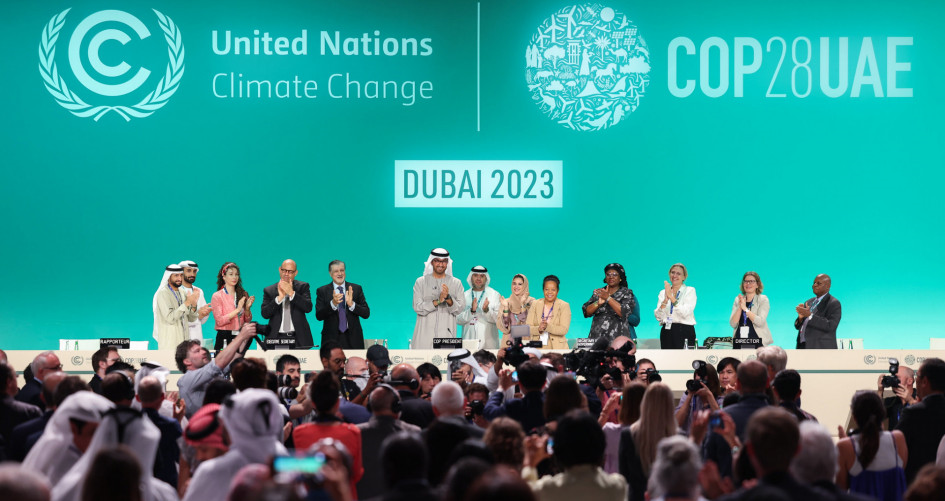
OR
Opinion
Unbridled Capitalism Heating Up Our Planet Earth
Published On: December 21, 2023 09:29 AM NPT By: Loknath Sangroula

The hypocrisy of the Western nations is glaring
The vital link between human activities and the environment underscores the need to recognize nature's intrinsic value for our survival. I would like to conclude this write-up with a Cree Indian proverb that succinctly captures this essence: "Only when the last tree is cut, the last fish caught, and the last stream poisoned will we realize we cannot eat money."
The 28th session of the Conference of the Parties (COP28), the apex assembly of the United Nations Framework Convention on Climate Change (UNFCCC), convened with the attendance of an extensive cohort comprising numerous global leaders and climate experts, endorsed a critical initiative of establishing a climate disaster "loss and damage fund" and the contentious issue of transitioning away from fossil fuels, emphasizing the swift, just and equitable transition, underpinned by deep emission cuts and scaled-up finance. This gathering underscored the intricate challenges and high-stakes deliberations that supposedly define the global pursuit of sustainable climate solutions. The discussions on how quickly fossil fuel should be ceased had pushed the COP into overtime by a day. The December 13 adoption of the Global Stocktake, a crucial element of the Paris Agreement scheduled to take place every five years, marked a historic occasion as it became the first COP text calling on countries to wean themselves off fossil fuels.
However, this was an incremental adjustment that merely scratched the surface of a draft that sparked controversy for its conspicuous omission of key phrases like "phase down" or "phase out" fossil fuel. For starters, the former entails a measured reduction in fossil-fuel burning without specifying targets for the quantity or a deadline for achieving net-zero, while the latter involves a decisive cessation of fossil-fuel burning, typically accompanied by goals such as reaching net-zero carbon emissions by a specific year. While the use of 'phase-out' or 'phase-down' language in the draft would have sent a strong message globally about a total shift away from fossil fuels, the current phrase ‘transitioning away’ – is somewhat ambiguous and open to interpretations.
The Loss and Damage Fund, first tabled at COP27 in Sharm el-Sheikh, Egypt last year, acknowledges the adverse impacts of climate change that go beyond what can be mitigated or adapted to. The fund aims to support vulnerable communities and developing nations facing the brunt of climate disasters, encompassing economic losses (such as infrastructure and revenue) and non-economic losses (trauma, loss of community and biodiversity, cultural heritage, etc.). Several countries have pledged a total of $700m, which, in fact, falls far, far short of the estimated $400bn damage caused by climate change each year, with the UAE and Germany each pledging $100m, Italy and France $108m, the UK $50.8m, the USA $17.5m, and China $10m. And, those seeking to stake a claim to the fund must prove that the losses and damage were caused by climate change and not by any other means. This is what we call 'attribution science.' Research shows that 55 vulnerable countries have suffered $525 billion in crisis-fueled losses in the last 20 years and this is estimated to reach $580 billion per year by 2030 (Indian Express, December 1, 2023).
The industrial era, which began in 1850, disrupted the earth's natural mechanism for the production and absorption of greenhouse gases (methane, nitrous oxide, water vapor, and carbon dioxide). Today, the USA, the UK, and the EU collectively contribute to 50% of global emissions. When factoring in Russia, Canada, Japan, and Australia, this figure rises to 65%, accounting for two-thirds of all emissions. While China is the biggest emitter in the last 15 years with its global share at 29.18%, followed by the USA and India with their shares at 14.2% and 7.09% respectively, China ranks forty-first in terms of per capita consumption, with the USA and India ranking 14th and 126th respectively. Qatar, Montenegro and Kuwait rank first, second and third respectively in terms of per capita consumption. Nepal ranks 94th in terms of its global emission share, whereas it holds the 180th rank in terms of per capita consumption (worldometers.info). However, experts argue that the resolution is marred by loopholes that provide the fossil fuel industry with numerous escape routes, relying on unproven, unsafe technologies.
The gathering (COP28) concluded the first assessment of progress, inter alia, that each state has made towards cutting back on emissions for the central tenet of the Paris Agreement, adopted in 2015, which is to limit the global warming to well below 2 degrees Celsius above pre-industrial levels, with efforts to limit it to 1.5 degree Celsius. The next global assessment of the Agreement targets is expected to take place at COP33 in 2028. At this summit, over 100 countries endorsed tripling reliance on renewables to reduce fossil-fuel dependency. However, experts note challenges due to financial pressures on developing nations. Rising interest rates make debt servicing more expensive, leaving little for health or climate action and such goals are difficult given the financial pressures on developing nations. About 70 nations are in "debt distress." Experts emphasize the need for global financial restructuring to enable developing countries to invest in climate measures.
The summit was not without controversies. Sultan al-Jaber, the COP president and chief of the Abu Dhabi National Oil Company, faced accusations of denying climate science. He countered these allegations, describing them as "repeated attempts to undermine" his presidency, stating that his questioning of climate science was "taken out of context with misrepresentation." In a letter dated December 6, OPEC urged its members to "proactively reject any text or formula that targets energy, i.e., fossil fuel rather than emissions," labeling campaigns against fossil fuel as "politically motivated." Despite the controversies, the conference managed to reach a consensus that could potentially have a meaningful impact if faithfully implemented in both its letter and spirit.
At a meeting of mountain countries during COP28, UN General Secretary Antonio Guterres underscored the alarming fact that nearly a third of Nepal's ice has vanished in just over 30 years, directly linked to greenhouse gas pollution. Guterres, who recently visited Nepal, including the Everest region, passionately called for developed countries to clarify the delivery of $100 billion, though acknowledging that these sums pale in comparison to the scale of actual needs. This impassioned plea found an echo within Prime Minister Pushpa Kamal Dahal. Guterres issued an emotional appeal to the conference, urging immediate action to address the urgent needs of vulnerable mountain countries facing the rapid melting of glaciers. He issued a stark warning that, without timely intervention, these glaciers could vanish altogether. This is a critical concern as approximately 240 million people rely on these glaciers and the major rivers they feed, including the Indus, the Ganges, and the Brahmaputra.
The climate science is very clear – put all stops to reduce global warming or heating, lest humanity should vanish. Even as I write this, various parts of the world may be reeling under weather extremes or unusually severe or atypical weather conditions― extreme heatwaves, severe storms, heavy precipitation, floodings, and drought. Developing nations find themselves disproportionately affected, lacking the means and capacity to confront the crisis head-on, while Western countries often fall short in taking the necessary steps to curb environmental pollution.
The hypocrisy of the Western nations is glaring. Despite being major contributors to centuries of planetary pollution for their own development, they hesitate to open their wallets to assist those most impacted. While they express a willingness to limit fossil fuel, the question arises: should the burden fall on the countries suffering the consequences or the affluent Western nations that accelerated climate change and environmental degradation? COP28 has called for contributions to the Climate Action Fund―a crucial initiative to propel the transition to clean energy and fund innovative green projects. But they do not seem to be walking the talk, do they? Millions have been funneled into organizing the event and the staggering carbon emissions from individuals flying in on private jets raise serious questions. The Guardian dated 20 Nov 2023 reveals that the richest 1% of humanity is responsible for more carbon emissions than the poorest 66%, with dire consequences for vulnerable communities. Today, a child born in the US produces 160 times more carbon emissions than one born in Niger. Are all these efforts merely for non-binding pledges and statements? Unless concrete steps are urgently taken before it's too late, these COP summits risk becoming nothing more than photo-ops, falling short of becoming effective solutions to the pressing problems of climate change.
Despite COP26 commitments to reverse forest loss, deforestation remains a critical issue. A Global Forest Watch report reveals an alarming annual loss of 10 million hectares from 2015 to 2020. The world lost tropical primary forests equivalent to the size of the Netherlands in 2021 alone. This rapid deforestation disrupts water cycles, erodes soil, and increases flooding, affecting millions. Tropical forests have stored 228 to 247 gigatons of CO2, over seven times annual human emissions. Deforestation, which contributes to nearly 15% of all greenhouse gas emissions, underscores the urgent need for effective conservation measures. And, remember, livestock farming is a major driver of deforestation. But how much stress does our meat-eating put on the ecological system? In 2006, the Livestock's Long Shadow, a report published by the FAO, calculated that the combined climate change emissions of animals bred for their meat were about 18% of the global total―more than cars, planes and all other forms of transport put together. Scientists, quoted in a May 2018 article published in The Guardian, state that avoiding meat and dairy products is the single biggest way to reduce our environmental impact on the planet.
Here, it's worth noting that the meat industry lobby wields significant influence. In a case from July 26, 2020, the United Nations was forced to delete a tweet stating "The meat industry is responsible for more greenhouse gas emissions than the world's biggest oil companies," following a backlash from farming groups worldwide. Given the scale of environmental damage wrought by humanity, the need for action is not just pressing―it demands swift and decisive measures.
Currently, there seems to be a surge in turning to Marx as a tool to find solutions to climate problems, as the present mode of living is heading towards catastrophe. Kohei Saito, 36-year associate professor at the University of Tokyo, in the Marx in the Anthropocene, observes that capitalism is no longer progressive, and rather destroys the general conditions of production and reproduction and even subjects human and non-human beings to serious existential threat. He quotes Greta Thunberg as explicitly stating that the capitalist system that aims for infinite accumulation on a finite planet is the root cause of climate breakdown. The greed-driven capitalism, prioritizing profit at any cost, is a major contributor to environmental breakdown.
After the Fukushima nuclear disaster in 2011, Saito realized how capitalism is not just simply exploiting workers but also seriously degrading the environment. Marx's theory of "metabolic rift," he argues, can determine how we respond to the climate and ecological crisis we now confront. This thesis contends that human-nature interaction is the basis of living, but capitalism disrupts these interactions, creating a gap that poses threats to both humans and the environment. Capitalism doesn’t just flout natural scarcity, caring little for the planet’s limits, it artificially creates a social scarcity, where we are always compelled to want more: the latest phone, car or jacket, Saito argues. He suggests that we can reshape how we connect with nature by envisioning a new form of abundance. This involves regulating advertising, limiting SUV use, and reducing constant changes in mobile phone models. Additionally, he emphasizes the importance of distributing wealth and responsibilities more fairly and justly within society.
The vital link between human activities and the environment underscores the need to recognize nature's intrinsic value for our survival. I would like to conclude this write-up with a Cree Indian proverb that succinctly captures this essence: "Only when the last tree is cut, the last fish caught, and the last stream poisoned will we realize we cannot eat money."
You May Like This

Capitalism’s Triple Crisis
LONDON – Capitalism is facing at least three major crises. A pandemic-induced health crisis has rapidly ignited an economic crisis... Read More...

Get real about purpose
A more purposeful capitalism requires more than just letters, speeches, and goodwill gestures ... Read More...

Pay-or-play capitalism
All companies need to embrace the principle of enlightened self-interest, and recognize that a healthy society is better for their... Read More...







Just In
- NRB to provide collateral-free loans to foreign employment seekers
- NEB to publish Grade 12 results next week
- Body handover begins; Relatives remain dissatisfied with insurance, compensation amount
- NC defers its plan to join Koshi govt
- NRB to review microfinance loan interest rate
- 134 dead in floods and landslides since onset of monsoon this year
- Mahakali Irrigation Project sees only 22 percent physical progress in 18 years
- Singapore now holds world's most powerful passport; Nepal stays at 98th












Leave A Comment